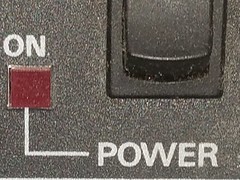 When life talks, listen. When a theme makes itself apparent repeatedly, take note. When the universe has something to say to you, offer it the microphone and pay attention.
When life talks, listen. When a theme makes itself apparent repeatedly, take note. When the universe has something to say to you, offer it the microphone and pay attention.
Over the past few months, I would say that I have been listening to the universe and attempting to derive a message from its mutterings at that very microphone. I try to embrace the concept of ďseek first to understand, then to be understoodĒ - but sometimes, that premise can be a little unruly and difficult.
 I will be the first to admit that I am probably the last person to quote a singing cowboy by the name of Gene Autry. However, the eloquence of the song title is a fitting sentiment today. Here I am, long-lost readers, returning from what seems like an abyss of time, academia, and Ö life.
I will be the first to admit that I am probably the last person to quote a singing cowboy by the name of Gene Autry. However, the eloquence of the song title is a fitting sentiment today. Here I am, long-lost readers, returning from what seems like an abyss of time, academia, and Ö life.
I promised myself that silence on these pages simply wasnít going to be an option again. However, when I uttered those words, I didnít have a road map for what was ahead of me. As I have written many times before, life brings us challenges and changes and opportunities. It also provides us with epiphanies and reflections which can be incredibly valuable if we pay heed to the lessons that can be learned. Two years on from my last post, I am back in the saddle again.
 Hello again, oh patient and faithful reader. Iíll be the first to admit that these pages have been silent for quite some time now. Itís the longest break Iíve had here, and it certainly wasnít a planned absence. Thereís been a lot of writing going on, for sure, just not much that has made itís way here. Please accept my apologies for the silence.
Hello again, oh patient and faithful reader. Iíll be the first to admit that these pages have been silent for quite some time now. Itís the longest break Iíve had here, and it certainly wasnít a planned absence. Thereís been a lot of writing going on, for sure, just not much that has made itís way here. Please accept my apologies for the silence.
Thereís been a pause - for many a cause. Let me tell you a little about the past year.
 The physical therapy profession is at a crossroads in the United States.
The physical therapy profession is at a crossroads in the United States.
Over the past couple of decades, Iíve watched our profession go into a disconcerting holding pattern. The struggles of 2016 are strangely reminiscent of those in 1996.
We are now faced with what appear to be some difficult questions at this juncture in the history of our profession, and one is very simple. Are we going to accept evolution, or is it time for revolution?
 Life is all about balance. It revolves around the principle of homeostasis: the regulation of variables so that internal conditions remain stable.
Life is all about balance. It revolves around the principle of homeostasis: the regulation of variables so that internal conditions remain stable.
Writing is but a subset of my world, but homeostasis certainly applies.
Some background is probably hugely valuable right now - otherwise you might think I have well and truly lost my mind in my extended absence from the pages of this blog.
 Silence. Itís one of the most beautiful things we experience in life. Itís also one of the most painful.
Silence. Itís one of the most beautiful things we experience in life. Itís also one of the most painful.
It might be difficult to imagine how one word can run the gamut across what appears to be the continuum of our lives. It spans the great divide between pleasure and pain, between beauty and agony, between love and loss.
Silence can be succulent and sensational. It can also be painful and power-hungry.
Itís time for all of us to break the silence on silence itself.
 All it takes is a quick look in the rear view mirror of life to get as much hindsight and perspective as you can handle. Iíve found that what I see there is oftentimes crystal clear - in retrospect.
All it takes is a quick look in the rear view mirror of life to get as much hindsight and perspective as you can handle. Iíve found that what I see there is oftentimes crystal clear - in retrospect.
When I gaze back at the year 2014, I find myself looking at 365 days in which I was face-to-face with love and loss, frustration and friendship, challenge and consternation.† It was the Year of the Dichotomy. I swear itís on the Chinese calendar.
With great adversity and challenge comes great awareness. Thatís my story, and I am sticking with it. In no particular order, here are a few things I learned along the way.
 "Running Injuries: Etiology And Recovery- Based Treatment" (co-author Bridget Clark, PT) appears in the third edition and fourth editions of "Clinical Orthopaedic Rehabilitation: A Team Approach" by Charles Giangarra, MD and Robert C. Manske, PT.
"Running Injuries: Etiology And Recovery- Based Treatment" (co-author Bridget Clark, PT) appears in the third edition and fourth editions of "Clinical Orthopaedic Rehabilitation: A Team Approach" by Charles Giangarra, MD and Robert C. Manske, PT.
 Allan Besselink, PT, DPT, Ph.D., Dip.MDT has a unique voice in the world of sports, education, and health care. Read more about Allan here.
Allan Besselink, PT, DPT, Ph.D., Dip.MDT has a unique voice in the world of sports, education, and health care. Read more about Allan here.
 Top 5 finalist in three categories: "Best Overall Blog", "Best PT Blog" and "Best Advocacy Blog".
Top 5 finalist in three categories: "Best Overall Blog", "Best PT Blog" and "Best Advocacy Blog".